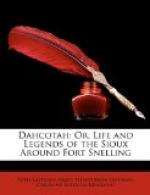If I cannot, in recounting the wild stories of this prophetess of the forest, give her own striking words, I shall at least be faithful to the spirit of her recitals. I shall let Indian life speak for itself; these true pictures of its course will tell its whole simple story better than any labored exposition of mine. Here we may see, not the red man of the novel or the drama, but the red man as he appears to himself, and to those who live with him. His better characteristics will be found quite as numerous as ought to be expected under the circumstances; his faults and his sufferings should appeal to the hearts of those who hold the means of his salvation. No intelligent citizen of these United States can without blame forget the aborigines of his country. Their wrongs cry to heaven; their souls will be required of us. To view them as brutes is an insult to Him who made them and us. May this little work do something towards exciting an interest in a single tribe out of the many whose only hope is in the mercy of the white man!
RED EARTH;
OR,
MOCKA-DOOTA-WIN.
“Good Road” is one of the Dahcotah chiefs—he is fifty years old and has two wives, but these two have given a deal of trouble; although the chief probably thinks it of no importance whether his two wives fight all the time or not, so that they obey his orders. For what would be a calamity in domestic life to us, is an every day affair among the Dahcotahs.
Good Road’s village is situated on the banks of the St. Peter’s about seven miles from Fort Snelling. And like other Indian villages it abounds in variety more than anything else. In the teepee the farthest from us, right on the edge of the shore, there are three young men carousing. One is inclined to go to sleep, but the other two will not let him; their spirits are raised and excited by what has made him stupid. Who would suppose they were human beings? See their bloodshot eyes; hear their fiendish laugh and horrid yells; probably before the revel is closed, one of the friends will have buried his knife in the other’s heart.
We will pass on to the next teepee. Here we witness a scene almost as appalling. “Iron Arms,” one of the most valiant warriors of the band, is stretched in the agonies of death. Old Spirit Killer, the medicine man, is gesticulating by his side, and accompanying his motions with the most horrid noises. But all in vain; the spirit of “Iron Arms,” the man of strength, is gone. The doctor says that his medicine was good, but that a prairie dog had entered into the body of the Dahcotah, and he thought it had been a mud-hen. Magnanimous doctor! All honor, that you can allow yourself in error.
While the friends of the dead warrior are rending the air with their cries, we will find out what is going on in the next wigwam. What a contrast!




